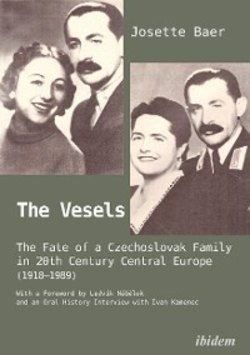Читать книгу The Vesels: The Fate of a Czechoslovak Family in 20th Century Central Europe (1918–1989) - Josette Baer - Страница 5
ОглавлениеERZEUGT DURCH JUTOH - BITTE REGISTRIEREN SIE SICH, UM DIESE ZEILE ZU ENTFERNEN
Foreword
Josette Baer’s book about my late great-uncles, the twins Mirko and Milan Vesel, is the first publication in English that deals with their activities in the Slovak National Uprising (SNP) in 1944. Baer’s study also presents an analysis of the attitude of the Vesel family – Slovak and Czechoslovak patriots in minds and hearts – towards the social and political changes that took place in Slovakia after 1938. As adherents of the democratic legacy of Masaryk and Štefánik and with the support of the members of their large family, the Vesel brothers took arms against the German occupying forces. Mirko, Milan and their youngest brother Miloš have a unique place in history as the only known example of three brothers who all became generals. As pars pro toto of the Slovak anti-Nazi resistance, they should not be forgotten, and nor should all those dedicated soldiers and partisans and their supporters amongst the civilian population who fought for freedom and justice in the Slovak mountains.
The tragic events of Slovak and Czechoslovak history are known only to a few experts, for whom it is no surprise that the momentous events of the uprising were followed by harsh years of ingratitude, marked by direct violations of the Vesels’ freedom and many hardships faced in their lives. The Vesels had a decisive influence on the course of the uprising and, with that, also the political direction and position of post-war Slovakia. And nobody will be surprised to learn that, despite everything that befell them, even in the direst moments, the Vesels never ceased to love their nation, in whose name they had sacrificed so much. It is a paradox of the years since their own lifetimes that the Vesel brothers received no acknowledgement whatsoever for what they did and what they stood for. Even today, when we are looking for personalities of Slovak history to hold up as role models for a younger generation that is often disoriented by manipulative demagogues, the Vesels do not receive due public recognition for their honourable actions and their legacy.
The Vesel family from the Zvolen and Banská Bystrica region wrote a chapter in the history of Slovakia, a chapter that can never be erased. My great-grandfather, lawyer and patriot Ján Vesel, the founder of the clan, was baptized in Radvany close to Banská Bystrica by one of the greatest Slovak poets, evangelical pastor Andrej Braxatoris-Sládkovič, the author of the collections of poems entitled Marína and Detvan. With his wife Kornélia, née Barányová, Ján Vesel brought up eleven children. In the brutal atmosphere of the Magyar assimilation and oppression of all Slavs that characterized Hungary in the last decades of the 19th and beginning of the 20th century, not only were all the children given beautiful Slovak names (Oľga, Elena, Viera, Želmíra, Mária, Ivan, Mirko, Milan, Zora, Kornélia and Miloš), they also received an education in the patriotic spirit, whose moral values would be tested by subsequent events.
Three men made the Vesel family famous; they were in the right place at the right time. Owing to their courage and indestructible faith in the forces of good, they did not hesitate when deciding what had to be done. Mirko, Milan and Miloš were officers by vocation; all three attained the military rank of general. The post-1989 democratic government of Czechoslovakia honoured Milan and Miloš with the title of general in memoriam. Not only administrative institutions but also the enemy were confused by the twins Mirko and Milan. Sometimes, it is said, not even their father could tell them apart. Their identical initials led to further confusion. To this day, there is some uncertainty about which brother is meant when M. Vesel is commemorated. In the years prior to WWII, all three brothers studied at the military academy in Hranice, Moravia – as if they sensed that the Slovak nation would soon need capable army officers. They suffered cruel fates, but perhaps this adversity was exactly what forged their characters and strong wills. Everything they accomplished was the result of their inner strength and desire to achieve something not only for themselves, but also for the nation. In the end, the stories of their lives finished in a manner which not even the best screenwriter or director could turn to more dramatic effect when portraying human destiny.
It is said that the nation is poor that has no heroes. To which we must add that a nation that does not honour its heroes is even poorer. “Boys, we have to do this!” Mirko Vesel told his brother Milan and colonel Marko on 29 August 1944 at 9.30 pm in Banská Bystrica when he learnt that the garrison of the high command of the Slovak infantry was in the hands of the pro-German officers Kanák and Zverín. This meant that General Ján Golian, who had been appointed commander of the uprising, could not arm the soldiers against the advancing German occupants. Together with my grandfather Ludvík Nábělek MD and the experienced politician Vavro Šrobár MD, the Vesel brothers became the men of the very first hour of the uprising, through a dramatic assumption of military command and the formulation of the call to arms against the Germans. The launch of the uprising was signalled by the proclamation to the Slovak soldiers and the proclamation to the Slovak nation, broadcast on 30 August 1944 by Free Slovak Radio.
On behalf of all the heroes, whom Josette Baer remembers in her principal publication, and who can no longer thank her, I express my deep and sincere gratitude.
Ludvík Nábělek MD,
Banská Bystrica, Slovak Republic
